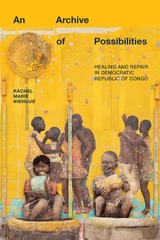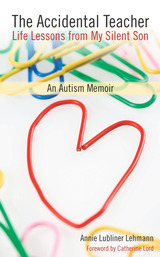
"Jonah Lehmann is an accidental teacher of others, including his family and friends. This personal and touching account of Jonah's life is enlightening, especially to those coming to terms with similar challenges with autism and other cognitive disabilities. It was written with love to support research on autism, and I recommend it to anyone and everyone touched by those of us who are different."
---Patricia E. Kefalas Dudek, Legal Advocate for People with Disabilities
"I have never read a book about a disabled person that caught me from page one. I could not put this one down. Lehmann offers a profound perspective on living with the reality of a severely disabled child. This book will be required reading for students who take my class in Special Education Administration."
---Frances LaPlante-Sosnowsky, Associate Professor of Education at Wayne State University
"A story of the astonishing power of human love and family triumph over hardship. Lehmann's story, engaging and at times both heartbreaking and joyful, offers an intimate view of one mother's journey as she works with professionals and a blur of caregivers to assist the ever-changing needs of her son. I highly recommend it to seasoned professionals in the field of autism and students preparing for careers in special education."
---Janet E. Graetz, Assistant Professor of Human Development and Child Studies at Oakland University
A child teaches without intending to . . .
Having severe autism does not stop Annie Lehmann's son Jonah from teaching her some of life's most valuable lessons. The Accidental Teacher, a heartfelt memoir about self-discovery rather than illness, uses insight and humor to weave a tale rich with kitchen-table wisdom. It explains the realities of life with a largely nonverbal son and explores the frustrations and triumphs of the Lehmann family as Jonah grew into a young adult. This book is a must-read for anyone who has been personally touched by a major life challenge.
Annie Lubliner Lehmann, a freelance writer for more than twenty-five years, has published articles in many newspapers and magazines, including the New York Times and Detroit Free Press. She resides in Michigan with her husband and two of her three children. Her eldest son, who inspired this memoir, is now a young adult with autism who lives in a supervised home.
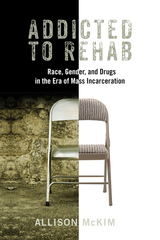
Winner of the 2018 Book of the Year Award from the American Society of Criminology's Division on Women and Crime
After decades of the American “war on drugs” and relentless prison expansion, political officials are finally challenging mass incarceration. Many point to an apparently promising solution to reduce the prison population: addiction treatment.
In Addicted to Rehab, Bard College sociologist Allison McKim gives an in-depth and innovative ethnographic account of two such rehab programs for women, one located in the criminal justice system and one located in the private healthcare system—two very different ways of defining and treating addiction. McKim’s book shows how addiction rehab reflects the race, class, and gender politics of the punitive turn. As a result, addiction has become a racialized category that has reorganized the link between punishment and welfare provision. While reformers hope that treatment will offer an alternative to punishment and help women, McKim argues that the framework of addiction further stigmatizes criminalized women and undermines our capacity to challenge gendered subordination. Her study ultimately reveals a two-tiered system, bifurcated by race and class.
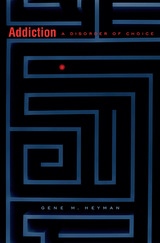
In a book sure to inspire controversy, Gene Heyman argues that conventional wisdom about addiction—that it is a disease, a compulsion beyond conscious control—is wrong.
Drawing on psychiatric epidemiology, addicts’ autobiographies, treatment studies, and advances in behavioral economics, Heyman makes a powerful case that addiction is voluntary. He shows that drug use, like all choices, is influenced by preferences and goals. But just as there are successful dieters, there are successful ex-addicts. In fact, addiction is the psychiatric disorder with the highest rate of recovery. But what ends an addiction?
At the heart of Heyman’s analysis is a startling view of choice and motivation that applies to all choices, not just the choice to use drugs. The conditions that promote quitting a drug addiction include new information, cultural values, and, of course, the costs and benefits of further drug use. Most of us avoid becoming drug dependent, not because we are especially rational, but because we loathe the idea of being an addict.
Heyman’s analysis of well-established but frequently ignored research leads to unexpected insights into how we make choices—from obesity to McMansionization—all rooted in our deep-seated tendency to consume too much of whatever we like best. As wealth increases and technology advances, the dilemma posed by addictive drugs spreads to new products. However, this remarkable and radical book points to a solution. If drug addicts typically beat addiction, then non-addicts can learn to control their natural tendency to take too much.
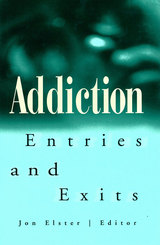

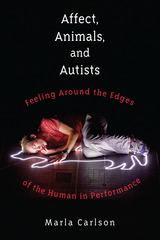
By analyzing specific structures of affect with the vocabulary of emotions, Marla Carlson builds upon the conception of affect articulated by psychologist Silvan Tomkins. The book treats a diverse selection of live performance and archival video and analyzes the ways in which they affect their audiences. The range of performances includes commercially successful productions such as The Curious Incident of the Dog in the Night-Time, War Horse, and The Lion King as well as to the more avant-garde and experimental theater created by Robert Wilson and Christopher Knowles, Back to Back Theatre, Elevator Repair Service, Pig Iron Theatre, and performance artist Deke Weaver.
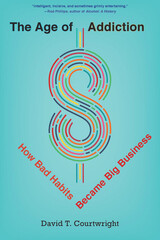
“A mind-blowing tour de force that unwraps the myriad objects of addiction that surround us…Intelligent, incisive, and sometimes grimly entertaining.”
—Rod Phillips, author of Alcohol: A History
“A fascinating history of corporate America’s efforts to shape our habits and desires.”
—Vox
We live in an age of addiction, from compulsive gaming and shopping to binge eating and opioid abuse. Sugar can be as habit-forming as cocaine, researchers tell us, and social media apps are deliberately hooking our kids. But what can we do to resist temptations that insidiously rewire our brains? A renowned expert on addiction, David Courtwright reveals how global enterprises have both created and catered to our addictions. The Age of Addiction chronicles the triumph of what he calls “limbic capitalism,” the growing network of competitive businesses targeting the brain pathways responsible for feeling, motivation, and long-term memory.
“Compulsively readable…In crisp and playful prose and with plenty of needed humor, Courtwright has written a fascinating history of what we like and why we like it, from the first taste of beer in the ancient Middle East to opioids in West Virginia.”
—American Conservative
“A sweeping, ambitious account of the evolution of addiction…This bold, thought-provoking synthesis will appeal to fans of ‘big history’ in the tradition of Guns, Germs, and Steel.”
—Publishers Weekly
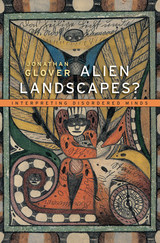
We have made huge progress in understanding the biology of mental illnesses, but comparatively little in interpreting them at the psychological level. The eminent philosopher Jonathan Glover believes that there is real hope of progress in the human interpretation of disordered minds.
The challenge is that the inner worlds of people with psychiatric disorders can seem strange, like alien landscapes, and this strangeness can deter attempts at understanding. Do people with disorders share enough psychology with other people to make interpretation possible? To explore this question, Glover tackles the hard cases—the inner worlds of hospitalized violent criminals, of people with delusions, and of those diagnosed with autism or schizophrenia. Their first-person accounts offer glimpses of inner worlds behind apparently bizarre psychiatric conditions and allow us to begin to learn the “language” used to express psychiatric disturbance. Art by psychiatric patients, or by such complex figures as van Gogh and William Blake, give insight when interpreted from Glover’s unique perspective. He also draws on dark chapters in psychiatry’s past to show the importance of not medicalizing behavior that merely transgresses social norms. And finally, Glover suggests values, especially those linked with agency and identity, to guide how the boundaries of psychiatry should be drawn.
Seamlessly blending philosophy, science, literature, and art, Alien Landscapes? is both a sustained defense of humanistic psychological interpretation and a compelling example of the rich and generous approach to mental life for which it argues.
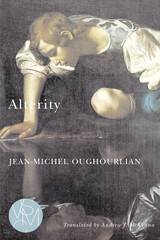
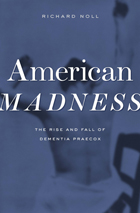
In 1895 there was not a single case of dementia praecox reported in the United States. By 1912 there were tens of thousands of people with this diagnosis locked up in asylums, hospitals, and jails. By 1927 it was fading away . How could such a terrible disease be discovered, affect so many lives, and then turn out to be something else?
In vivid detail, Richard Noll describes how the discovery of this mysterious disorder gave hope to the overworked asylum doctors that they could at last explain—though they could not cure—the miserable patients surrounding them. The story of dementia praecox, and its eventual replacement by the new concept of schizophrenia, also reveals how asylum physicians fought for their own respectability. If what they were observing was a disease, then this biological reality was amenable to scientific research. In the early twentieth century, dementia praecox was psychiatry’s key into an increasingly science-focused medical profession.
But for the moment, nothing could be done to help the sufferers. When the concept of schizophrenia offered a fresh understanding of this disorder, and hope for a cure, psychiatry abandoned the old disease for the new. In this dramatic story of a vanished diagnosis, Noll shows the co-dependency between a disease and the scientific status of the profession that treats it. The ghost of dementia praecox haunts today’s debates about the latest generation of psychiatric disorders.
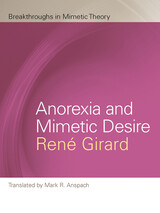
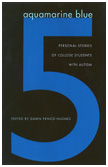
Rated Outstanding by the American Association of School Libraries
This is the first book to be written by autistic college students about the challenges they face. Aquamarine Blue 5 details the struggle of these highly sensitive students and shows that there are gifts specific to autistic students that enrich the university system, scholarship, and the world as a whole.
Dawn Prince-Hughes presents an array of writings by students who have been diagnosed with Asperger’s Syndrome or High-Functioning Autism, showing their unique ways of looking at and solving problems. In their own words, they portray how their divergent thinking skills could be put to great use if they were given an opportunity. Many such students never get the chance because the same sensitivity that gives them these insights makes the flicker of fluorescent lights and the sound of chalk on the board unbearable For simple—and easily remedied—reasons, we lose these students, who are as gifted as they are challenged.
Aquamarine Blue 5 is a showcase of the strength and resilient character of individuals with Asperger’s Syndrome. It will be an invaluable resource for those touched by this syndrome, their friends and families, and school administrators.
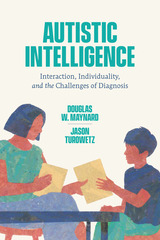
As autism has grown in prevalence, so too have our attempts to make sense of it. From placing unfounded blame on vaccines to seeking a genetic cause, Americans have struggled to understand what autism is and where it comes from. Amidst these efforts, however, a key aspect of autism has been largely overlooked: the diagnostic process itself. That process is the central focus of Autistic Intelligence. The authors ask us to question the norms by which we measure autistic behavior, to probe how that behavior can be considered sensible rather than disordered, and to explore how we can better appreciate the individuality of those who receive the diagnosis.
Drawing on hundreds of hours of video recordings and ethnographic observations at a clinic where professionals evaluated children for autism, the authors’ analysis of interactions among clinicians, parents, and children demystifies the categories, tools, and practices involved in the diagnostic process. Autistic Intelligence shows that autism is not a stable category; it is the outcome of complex interactional processes involving professionals, children, families, and facets of the social and clinical environments they inhabit. The authors suggest that diagnosis, in addition to carefully classifying children, also can highlight or include unique and particular contributions those with autism potentially can make to the world around us.

Throughout the chapters in this book, the expert caregiver is one person who faces unbelievably daunting tasks of filling or reforming persistent institutional gaps, primarily in education and healthcare, and subverting ableist cultural norms. Without institutional support, answers to their questions, or pragmatic avenues to access resources, lay caregivers become the experts. Their trials and tribulations, especially when navigating the boundaries of professional/lay and private/public worlds, illuminate a type of carework that is increasingly relevant to a growing number of young families caring for neurodivergent, disabled, medically fragile, and/or chronically ill children. These stories offer a vivid picture of the often invisible complex challenges and structural forces that drive individuals to become expert caregivers in the first place.
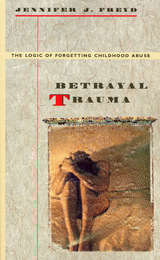
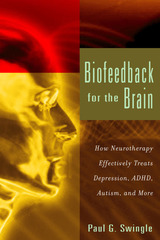
Neurofeedback is a cutting-edge, drug-free therapeutic technique used by over a thousand licensed therapists in North America to treat a range of conditions from attention deficit and hyperactivity disorders to epilepsy, stroke, anxiety, migraine, and depression. First popularized in the 1970s, this naturalistic method is based on the idea that we can control our brain activity and that, through training, the brain can learn to modify its own electrical patterns for more efficient processing or to overcome various states of dysfunction.
In Biofeedback for the Brain, Dr. Paul G. Swingle describes in clear and coherent language how these procedures work. With numerous actual case examples, readers follow the progress of clients from the initial “brain map” that shows the location and severity of the neurological abnormalities to the various stages of treatment. Conditions often considered untreatable by conventional health practitioners respond positively to neurotherapeutic treatment and Swingle describes many of these remarkable recoveries. Other chapters describe the use of neurotherapy for a variety of surprising purposes, including performance training for elite athletes, of which the most famous example is the Italian soccer team who considered the technique to be their “secret weapon” in attaining a World Cup victory.
Despite wide-ranging success stories and the endorsement of the American Psychological Association, many health care practitioners remain skeptical of neurofeedback and the procedures are still not well-known by the public or conventional health care providers. This book provides a thorough, definitive, and highly readable presentation of this remarkable health care alternative that offers millions of individuals a chance for healing.

For De Pree, between being a girl and being a woman, there was starvation. Body Story is her intimate account of girlhood, virginity, anorexia, and motherhood. De Pree's prose is spare and unguarded, revealing in vivid flashbacks and poignant vignettes the sources of her inner pain.
In high school, the five-foot-ten De Pree weighed as little as 114 pounds. She was too weak to raise her arms above her head. “In a paradoxical way, I starved my body in order to understand my life,” she writes. “I had to place my body in suspension before I could move physically into sexuality. Starving allowed me to create an interim space between innocence and experience.”
De Pree renders the starkness of anorexia along with the process of recovery, relapse, and, ultimately, redemption. She also tells the story of the physical landscape, from her origins in the Midwest to the American South, Paris, and the vast New Mexican desert, as well as the psychic landscape of her body as it encounters the joys and challenges of maturation, childbirth, and motherhood.
De Pree offers readers a new way of understanding women¿s bodily experience, as she writes about the mystery and the meaning of her illness. As many as eight million Americans suffer from eating disorders. Body Story, unlike clinical reports or news accounts, illuminates the complexity of anorexia as the narrative moves toward a subjective and deeply personal truth.
This evocative and often radiant vision is a unique window into womanhood and selfhood in middle-class, contemporary America.

The drug war that has turned Juárez, Mexico, into a killing field that has claimed more than 7,000 lives since 2008 captures headlines almost daily. But few accounts go all the way down to the streets to investigate the lives of individual drug users. One of those users, Scott Comar, survived years of heroin addiction and failed attempts at detox and finally cleaned up in 2003. Now a graduate student at the University of Texas at El Paso in the history department's borderlands doctoral program, Comar has written Border Junkies, a searingly honest account of his spiraling descent into heroin addiction, surrender, change, and recovery on the U.S.-Mexico border.
Border Junkies is the first book ever written about the lifestyle of active addiction on the streets of Juárez. Comar vividly describes living between the disparate Mexican and American cultures and among the fellow junkies, drug dealers, hookers, coyote smugglers, thieves, and killers who were his friends and neighbors in addiction—and the social workers, missionaries, shelter workers, and doctors who tried to help him escape. With the perspective of his anthropological training, he shows how homelessness, poverty, and addiction all fuel the use of narcotics and the rise in their consumption on the streets of Juárez and contribute to the societal decay of this Mexican urban landscape. Comar also offers significant insights into the U.S.-Mexico borderland's underground and peripheral economy and the ways in which the region's inhabitants adapt to the local economic terrain.

One of the major concerns about the changing U.S. health-care systems is whether they will improve or diminish the quality and cost-effectiveness of medical care. The shift from a fee-for-service to a prepaid method of reimbursement has greatly changed the incentives of patients to seek care as well as those of providers to supply it. This change poses a particular challenge for care of depressed patients, a vulnerable population that often does not advocate for its own care. This book documents the inefficiencies of our national systems--prepaid as well as fee-for-service--for treating depression and explores how they can be improved.
Although depression is a major illness affecting millions of people, it is seriously undertreated in the United States. The ongoing shift of mental-health care away from specialists and toward primary medical-care providers is causing fewer depressed patients to be appropriately diagnosed and treated. Depression is frequently more devastating than other major illnesses, such as arthritis and heart disease, because it often begins at a younger age, when people are at their productive peak and thus at risk of permanently damaging their careers. It also differs from many medical conditions in that its indirect costs are usually much higher than direct treatment costs.
The authors urge the integration of both medical and economic considerations in designing policies for the treatment of depression. They show that by spending more money efficiently on care, the nation will gain greater health improvements per dollar invested and a more productive population.
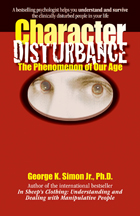
Modern permissiveness and the new culture of entitlement allows disturbed people to reach adulthood without proper socialization. In a book meant both for the general public and for professionals, bestselling author and psychologist George Simon explains in plain English:
•How most disturbed characters think.•The habitual behaviors the disturbed use to avoid responsibility and to manipulate, deceive, and exploit others.
•Why victims in relationships with disturbed characters do not get help they need from traditional therapies.
•A straightforward guide to recognizing and understanding all relevant personality types, especially those most likely to undermine relationships.
•A new framework for making sense of the crazy world many find themselves in when there's a disturbed character in their lives.
•Concrete principles that promote responsibility and positive change when engaging disturbed characters.
•Tactics (for both lay persons and therapists) to lessen the chances for victimization and empower those who would otherwise be victims in their relationships with many types of disturbed characters.

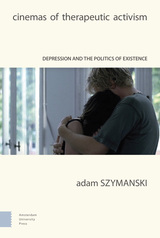
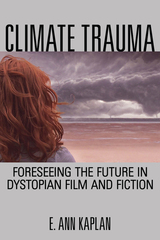
Drawing from recent scholarship that analyzes climate change as a form of “slow violence” that humans are inflicting on the environment, Climate Trauma theorizes that such violence is accompanied by its own psychological condition, what its author terms “Pretraumatic Stress Disorder.” Examining a variety of films that imagine a dystopian future, renowned media scholar E. Ann Kaplan considers how the increasing ubiquity of these works has exacerbated our sense of impending dread. But she also explores ways these films might help us productively engage with our anxieties, giving us a seemingly prophetic glimpse of the terrifying future selves we might still work to avoid becoming.
Examining dystopian classics like Soylent Green alongside more recent examples like The Book of Eli, Climate Trauma also stretches the limits of the genre to include features such as Blindness, The Happening, Take Shelter, and a number of documentaries on climate change. These eclectic texts allow Kaplan to outline the typical blind-spots of the genre, which rarely depicts climate catastrophe from the vantage point of women or minorities. Lucidly synthesizing cutting-edge research in media studies, psychoanalytic theory, and environmental science, Climate Trauma provides us with the tools we need to extract something useful from our nightmares of a catastrophic future.

It inspired written testimonials from William McKinley, Thomas Edison, and Sarah Bernhardt; merited a medal from Pope Leo XIII; produced "exhilaration and lasting euphoria" in Sigmund Freud. Once the stimulant of choice of the enlightened and the elite, cocaine has become, a century later, a plague, ravaging the lives of millions. This book is the first to draw together all the facts about this pervasive drug--from its natural occurrence in a tea-like native South American plant to its devastating appearance as crack in the inner cities of the United States.
Drawing on the latest work in medicine, psychiatry, neuroscience, pharmacology, epidemiology, social work, and sociology, the volume is a highly accessible reference on the history and use of cocaine, its physical and psychological effects, and the etiology and epidemiology of cocaine addiction. It also provides a critical evaluation of the pharmaceutical agents and psychosocial interventions that have been used to treat this addiction. Author Jerome J. Platt answers such basic questions as: What is cocaine? What forms does it come in? How is it administered? What does it do? What are the medical complications of cocaine addiction? What are the treatments, and how successful are they?
Uniquely comprehensive, Cocaine Addiction makes all the latest information on this urgent subject readily available to medical professionals and practitioners, social workers and scholars, and anyone who cares to know more about this perennially troubling drug.
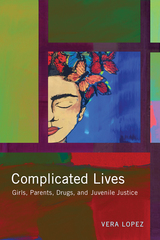
Complicated Lives focuses on the lives of sixty-five drug-using girls in the juvenile justice system (living in group homes, a residential treatment center, and a youth correctional facility) who grew up in families characterized by parental drug use, violence, and child maltreatment. Vera Lopez situates girls’ relationships with parents who fail to live up to idealized parenting norms and examines how these relationships change over time, and ultimately contribute to the girls’ future drug use and involvement in the justice system.
While Lopez’s subjects express concerns and doubt in their chances for success, Lopez provides an optimistic prescription for reform and improvement of the lives of these young women and presents a number of suggestions ranging from enhanced cultural competency training for all juvenile justice professionals to developing stronger collaborations between youth and adult serving systems and agencies.
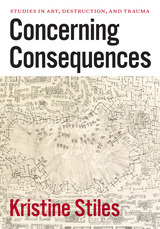
The essays in this book focus primarily on performance art and photography. From war and environmental pollution to racism and sexual assault, Stiles analyzes the consequences of trauma as seen in the works of artists like Marina Abramovic, Pope.L, and Chris Burden. Assembling rich intellectual explorations on everything from Paleolithic paintings to the Bible’s patriarchal legacies to documentary images of nuclear explosions, Concerning Consequences explores how art can provide a distinctive means of understanding trauma and promote individual and collective healing.
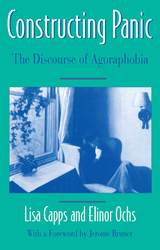
Meg Logan has not been farther than two miles from home in six years. She has agoraphobia, a debilitating anxiety disorder that entraps its sufferers in the fear of leaving safe havens such as home. Paradoxically, while at this safe haven, agoraphobics spend much of their time ruminating over past panic experiences and imagining similar hypothetical situations. In doing so, they create a narrative that both describes their experience and locks them into it.
Constructing Panic offers an unprecedented analysis of one patient's experience of agoraphobia. In this novel interdisciplinary collaboration between a clinical psychologist and a linguist, the authors probe Meg's stories for constructions of emotions, actions, and events. They illustrate how Meg uses grammar and narrative structure to create and recreate emotional experiences that maintain her agoraphobic identity.
In this work Capps and Ochs propose a startling new view of agoraphobia as a communicative disorder. Constructing Panic opens up the largely overlooked potential for linguistic and narrative analysis by revealing the roots of panic and by offering a unique framework for therapeutic intervention. Readers will find in these pages hope for managing panic through careful attention to how we tell the story of our lives.
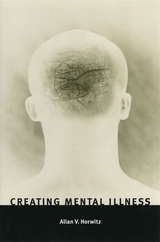
"Thought-provoking and important. . .Drawing on and consolidating the ideas of a range of authors, Horwitz challenges the existing use of the term mental illness and the psychiatric ideas and practices on which this usage is based. . . . Horwitz enters this controversial territory with confidence, conviction, and clarity."—Joan Busfield, American Journal of Sociology
"Horwitz properly identifies the financial incentives that urge therapists and drug companies to proliferate psychiatric diagnostic categories. He correctly identifies the stranglehold that psychiatric diagnosis has on research funding in mental health. Above all, he provides a sorely needed counterpoint to the most strident advocates of disease-model psychiatry."—Mark Sullivan, Journal of the American Medical Association
"Horwitz makes at least two major contributions to our understanding of mental disorders. First, he eloquently draws on evidence from the biological and social sciences to create a balanced, integrative approach to the study of mental disorders. Second, in accomplishing the first contribution, he provides a fascinating history of the study and treatment of mental disorders. . . from early asylum work to the rise of modern biological psychiatry."—Debra Umberson, Quarterly Review of Biology
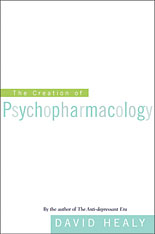
David Healy follows his widely praised study, The Antidepressant Era, with an even more ambitious and dramatic story: the discovery and development of antipsychotic medication. Healy argues that the discovery of chlorpromazine (more generally known as Thorazine) is as significant in the history of medicine as the discovery of penicillin, reminding readers of the worldwide prevalence of insanity within living memory.
But Healy tells not of the triumph of science but of a stream of fruitful accidents, of technological discovery leading neuroscientific research, of fierce professional competition and the backlash of the antipsychiatry movement of the 1960s. A chemical treatment was developed for one purpose, and as long as some theoretical rationale could be found, doctors administered it to the insane patients in their care to see if it would help. Sometimes it did, dramatically. Why these treatments worked, Healy argues provocatively, was, and often still is, a mystery. Nonetheless, such discoveries made and unmade academic reputations and inspired intense politicking for the Nobel Prize.
Once pharmaceutical companies recognized the commercial potential of antipsychotic medications, financial as well as clinical pressures drove the development of ever more aggressively marketed medications. With verve and immense learning, Healy tells a story with surprising implications in a book that will become the leading scholarly work on its compelling subject.
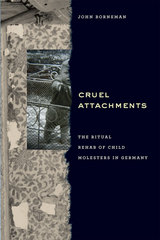
Carefully exploring different cases of the attempt to rehabilitate child sex offenders, Borneman details a secular ritual process aimed not only at preventing future acts of molestation but also at fundamentally transforming the offender, who is ultimately charged with creating an almost entirely new self. Acknowledging the powerful repulsion felt by a public that is often extremely skeptical about the success of rehabilitation, he challenges readers to confront the contemporary contexts and conundrums that lie at the heart of regulating intimacy between children and adults.
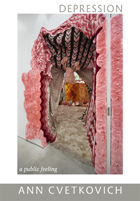
Cvetkovich draws on an unusual archive, including accounts of early Christian acedia and spiritual despair, texts connecting the histories of slavery and colonialism with their violent present-day legacies, and utopian spaces created from lesbian feminist practices of crafting. She herself seeks to craft a queer cultural analysis that accounts for depression as a historical category, a felt experience, and a point of entry into discussions about theory, contemporary culture, and everyday life. Depression: A Public Feeling suggests that utopian visions can reside in daily habits and practices, such as writing and yoga, and it highlights the centrality of somatic and felt experience to political activism and social transformation.
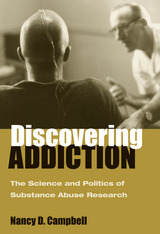
Discovering Addiction brings the history of human and animal experimentation in addiction science into the present with a wealth of archival research and dozens of oral-history interviews with addiction researchers. Professor Campbell examines the birth of addiction science---the National Academy of Sciences's project to find a pharmacological fix for narcotics addiction in the late 1930s---and then explores the human and primate experimentation involved in the succeeding studies of the "opium problem," revealing how addiction science became "brain science" by the 1990s.
Psychoactive drugs have always had multiple personalities---some cause social problems; others solve them---and the study of these drugs involves similar contradictions. Discovering Addiction enriches discussions of bioethics by exploring controversial topics, including the federal prison research that took place in the 1970s---a still unresolved debate that continues to divide the research community---and the effect of new rules regarding informed consent and the calculus of risk and benefit. This fascinating volume is both an informative history and a thought-provoking guide that asks whether it is possible to differentiate between ethical and unethical research by looking closely at how science is made.
Nancy D. Campbell is Associate Professor of Science and Technology Studies at Rensselaer Polytechnic Institute and the author of Using Women: Gender, Drug Policy, and Social Justice.
"Compelling and original, lively and engaging---Discovering Addiction opens up new ways of thinking about drug policy as well as the historical discourses of addiction."
---Carol Stabile, University of Wisconsin--Milwaukee
Also available:
Student Bodies: The Influence of Student Health Services in American Society and Medicine, by Heather Munro Prescott
Illness and the Limits of Expression, by Kathlyn Conway
White Coat, Clenched Fist: The Political Education of an American Physician, by Fitzhugh Mullan
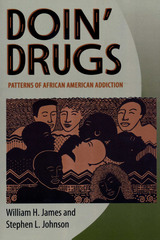
Throughout the African American community, individuals and organizations ranging from churches to schools to drug treatment centers are fighting the widespread use of crack cocaine. To put that fight in a larger cultural context, Doin' Drugs explores historical patterns of alcohol and drug use from pre-slavery Africa to present-day urban America.
William Henry James and Stephen Lloyd Johnson document the role of alcohol and other drugs in traditional African cultures, among African slaves before the American Civil War, and in contemporary African American society, which has experienced the epidemics of marijuana, heroin, crack cocaine, and gangs since the beginning of this century. The authors zero in on the interplay of addiction and race to uncover the social and psychological factors that underlie addiction.
James and Johnson also highlight many culturally informed programs, particularly those sponsored by African American churches, that are successfully breaking the patterns of addiction. The authors hope that the information in this book will be used to train a new generation of counselors, ministers, social workers, nurses, and physicians to be better prepared to face the epidemic of drug addiction in African American communities.
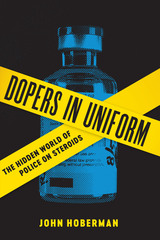
The recorded use of deadly force against unarmed suspects and sustained protest from the Black Lives Matter movement, among others, have ignited a national debate about excessive violence in American policing. Missing from the debate, however, is any discussion of a factor that is almost certainly contributing to the violence—the use of anabolic steroids by police officers. Mounting evidence from a wide range of credible sources suggests that many cops are abusing testosterone and its synthetic derivatives. This drug use is illegal and encourages a “steroidal” policing style based on aggressive behaviors and hulking physiques that diminishes public trust in law enforcement.
Dopers in Uniform offers the first assessment of the dimensions and consequences of the felony use of anabolic steroids in major urban police departments. Marshalling an array of evidence, John Hoberman refutes the frequent claim that police steroid use is limited to a few “bad apples,” explains how the “Blue Wall of Silence” stymies the collection of data, and introduces readers to the broader marketplace for androgenic drugs. He then turns his attention to the people and organizations at the heart of police culture: the police chiefs who often see scandals involving steroid use as a distraction from dealing with more dramatic forms of misconduct and the police unions that fight against steroid testing by claiming an officer’s “right to privacy” is of greater importance. Hoberman’s findings clearly demonstrate the crucial need to analyze and expose the police steroid culture for the purpose of formulating a public policy to deal with its dysfunctional effects.

"I started out snorting a couple of lines a night and ended up injecting and snorting about three grams a day."--That could be your dentist talking.
"I worked a lot with hangovers and made lots of mistakes when coming down off acid."--That might be your nurse.
"The patient was waking up and I was out cold."--And that was some unlucky patient's anesthesiologist.
Professionals trusted with our well-being are the last people we suspect of drug addiction. And yet they are at least as likely as anyone else to abuse alcohol and other drugs--a well-kept secret finally aired and fully examined in this powerful book. Drawing on more than 120 personal interviews with addicted physicians, dentists, nurses, pharmacists, attorneys, and airline pilots and those who treat them, Robert Coombs gives us a startling picture of drug abuse among "pedestal professionals." He discusses addiction as an occupational hazard for those with the easiest access to drugs, the greatest sense of immunity to their perils, and the most extensive means (and reasons) for hiding their problems. Throughout, the interviewees' eloquent and often harrowing testimony reminds us of the human drama behind the exhaustive research and analysis presented here. Their bittersweet stories bear out Coombs's contention that recovering addicts, free of their magical elixirs, can become more complete people than they were before addiction.
From the biological, psychosocial, and spiritual roots of addiction to the equally diverse approaches to recovery, to the merits and failures of government drug policy, Drug-Impaired Professionals offers a clear and complete overview of a complex problem that affects nearly every family in America.
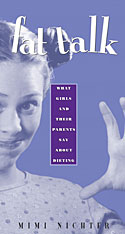
Teen-aged girls hate their bodies and diet obsessively, or so we hear. News stories and reports of survey research often claim that as many as three girls in five are on a diet at any given time, and they grimly suggest that many are “at risk” for eating disorders. But how much can we believe these frightening stories? What do teenagers mean when they say they are dieting?
Anthropologist Mimi Nichter spent three years interviewing middle school and high school girls—lower-middle to middle class, white, black, and Latina—about their feelings concerning appearance, their eating habits, and dieting. In Fat Talk, she tells us what the girls told her, and explores the influence of peers, family, and the media on girls’ sense of self. Letting girls speak for themselves, she gives us the human side of survey statistics.
Most of the white girls in her study disliked something about their bodies and knew all too well that they did not look like the envied, hated “perfect girl.” But they did not diet so much as talk about dieting. Nichter wryly argues—in fact some of the girls as much as tell her—that “fat talk” is a kind of social ritual among friends, a way of being, or creating solidarity. It allows the girls to show that they are concerned about their weight, but it lessens the urgency to do anything about it, other than diet from breakfast to lunch. Nichter concludes that if anything, girls are watching their weight and what they eat, as well as trying to get some exercise and eat “healthfully” in a way that sounds much less disturbing than stories about the epidemic of eating disorders among American girls.
Black girls, Nichter learned, escape the weight obsession and the “fat talk” that is so pervasive among white girls. The African-American girls she talked with were much more satisfied with their bodies than were the white girls. For them, beauty was a matter of projecting attitude (“’tude”) and moving with confidence and style.
Fat Talk takes the reader into the lives of girls as daughters, providing insights into how parents talk to their teenagers about their changing bodies. The black girls admired their mothers’ strength; the white girls described their mothers’ own “fat talk,” their fathers’ uncomfortable teasing, and the way they and their mothers sometimes dieted together to escape the family “curse”—flabby thighs, ample hips. Moving beyond negative stereotypes of mother–daughter relationships, Nichter sensitively examines the issues and struggles that mothers face in bringing up their daughters, particularly in relation to body image, and considers how they can help their daughters move beyond rigid and stereotyped images of ideal beauty.
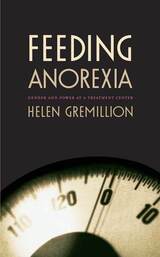
Feeding Anorexia is based on fourteen months of ethnographic research in a small inpatient unit located in a major teaching and research hospital in the western United States. Gremillion attended group, family, and individual therapy sessions and medical staff meetings; ate meals with patients; and took part in outings and recreational activities. She also conducted over one hundred interviews-with patients, parents, staff, and clinicians. Among the issues she explores are the relationship between calorie-counting and the management of consumer desire; why the "typical" anorexic patient is middle-class and white; the extent to which power differentials among clinicians, staff, and patients model "anorexic families"; and the potential of narrative therapy to constructively reframe some of the problematic assumptions underlying more mainstream treatments.
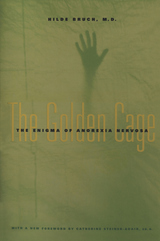
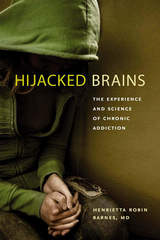
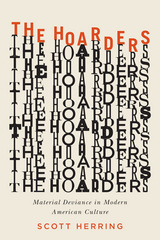
In The Hoarders, Scott Herring provides an in-depth examination of how modern hoarders came into being, from their onset in the late 1930s to the present day. He finds that both the idea of organization and the role of the clutterologist are deeply ingrained in our culture, and that there is a fine line between clutter and deviance in America. Herring introduces us to Jill, whose countertops are piled high with decaying food and whose cabinets are overrun with purchases, while the fly strips hanging from her ceiling are arguably more fly than strip. When Jill spots a decomposing pumpkin about to be jettisoned, she stops, seeing in the rotting, squalid vegetable a special treasure. “I’ve never seen one quite like this before,” she says, and looks to see if any seeds remain. It is from moments like these that Herring builds his questions: What counts as an acceptable material life—and who decides? Is hoarding some sort of inherent deviation of the mind, or a recent historical phenomenon grounded in changing material cultures? Herring opts for the latter, explaining that hoarders attract attention not because they are mentally ill but because they challenge normal modes of material relations. Piled high with detailed and, at times, disturbing descriptions of uncleanliness, The Hoarders delivers a sweeping and fascinating history of hoarding that will cause us all to reconsider how we view these accumulators of clutter.


Humans are social animals and, in general, don’t thrive in isolated environments. Homeless people, many of whom suffer from serious mental illnesses, often live socially isolated on the streets or in shelters. Homelessness, Housing, and Mental Illness describes a carefully designed large-scale study to assess how well these people do when attempts are made to reduce their social isolation and integrate them into the community.
Should homeless mentally ill people be provided with the type of housing they want or with what clinicians think they need? Is residential staff necessary? Are roommates advantageous? How is community integration affected by substance abuse, psychiatric diagnoses, and cognitive functioning? Homelessness, Housing, and Mental Illness answers these questions and reexamines the assumptions behind housing policies that support the preference of most homeless mentally ill people to live alone in independent apartments. The analysis shows that living alone reduces housing retention as well as cognitive functioning, while group homes improve these critical outcomes. Throughout the book, Russell Schutt explores the meaning and value of community for our most fragile citizens.

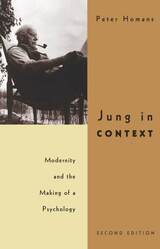
"Jung in Context is an intellectual triumph. . . . Utilizes the resources of biography, psychology, sociology, and theology to probe the genesis of a psychological system which is currently enjoying a wide following. . . . A splendid job."—Lewis R. Rambo, Psychiatry
"Anyone seeking an introduction to Jung's thought will find a masterful précis here."—Jan Goldstein, Journal of Sociology
"An unusually perceptive and clearly written book. . . . An important advance in the understanding of Jung, and Homans's methodology sets the stage for all future efforts to understand psychological innovators."—Herbert H. Stroup, Christian Century
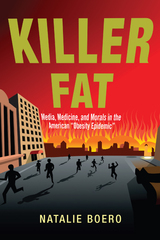
In the past decade, obesity has emerged as a major public health concern in the United States and abroad. At the federal, state, and local level, policy makers have begun drafting a range of policies to fight a war against fat, including body-mass index (BMI) report cards, “snack taxes,” and laws to control how fast food companies market to children. As an epidemic, obesity threatens to weaken the health, economy, and might of the most powerful nation in the world.
In Killer Fat, Natalie Boero examines how and why obesity emerged as a major public health concern and national obsession in recent years. Using primary sources and in-depth interviews, Boero enters the world of bariatric surgeries, Weight Watchers, and Overeaters Anonymous to show how common expectations of what bodies are supposed to look like help to determine what sorts of interventions and policies are considered urgent in containing this new kind of disease.
Boero argues that obesity, like the traditional epidemics of biological contagion and mass death, now incites panic, a doomsday scenario that must be confronted in a struggle for social stability. The “war” on obesity, she concludes, is a form of social control. Killer Fat ultimately offers an alternate framing of the nation’s obesity problem based on the insights of the “Health at Every Size” movement.
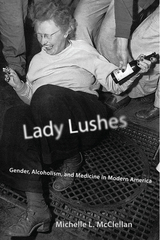
In Lady Lushes, medical historian Michelle L. McClellan traces the story of the female alcoholic from the late-nineteenth through the twentieth century. She draws on a range of sources to demonstrate the persistence of the belief that alcohol use is antithetical to an idealized feminine role, particularly one that glorifies motherhood. Lady Lushes offers a fresh perspective on the importance of gender role ideology in the formation of medical knowledge and authority.
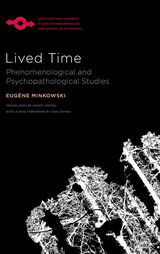
First published in French in 1933 as Le temps vécu, this edition of this classic work of phenomenological psychiatry and psychopathology includes a new foreword by Dan Zahavi that presents some of Minkowski’s main ideas and discusses his contemporary relevance.
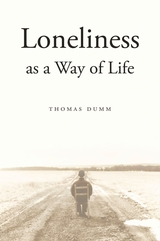
“What does it mean to be lonely?” Thomas Dumm asks. His inquiry, documented in this book, takes us beyond social circumstances and into the deeper forces that shape our very existence as modern individuals. The modern individual, Dumm suggests, is fundamentally a lonely self. Through reflections on philosophy, political theory, literature, and tragic drama, he proceeds to illuminate a hidden dimension of the human condition. His book shows how loneliness shapes the contemporary division between public and private, our inability to live with each other honestly and in comity, the estranged forms that our intimate relationships assume, and the weakness of our common bonds.
A reading of the relationship between Cordelia and her father in Shakespeare’s King Lear points to the most basic dynamic of modern loneliness—how it is a response to the problem of the “missing mother.” Dumm goes on to explore the most important dimensions of lonely experience—Being, Having, Loving, and Grieving. As the book unfolds, he juxtaposes new interpretations of iconic cultural texts—Moby-Dick, Death of a Salesman, the film Paris, Texas, Emerson’s “Experience,” to name a few—with his own experiences of loneliness, as a son, as a father, and as a grieving husband and widower.
Written with deceptive simplicity, Loneliness as a Way of Life is something rare—an intellectual study that is passionately personal. It challenges us, not to overcome our loneliness, but to learn how to re-inhabit it in a better way. To fail to do so, this book reveals, will only intensify the power that it holds over us.
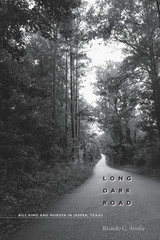
On a long dark road in deep East Texas, James Byrd Jr. was dragged to his death behind a pickup truck one summer night in 1998. The brutal modern-day lynching stunned people across America and left everyone at a loss to explain how such a heinous crime could possibly happen in our more racially enlightened times. Many eventually found an answer in the fact that two of the three men convicted of the murder had ties to the white supremacist Confederate Knights of America. In the ex-convict ringleader, Bill King, whose body was covered in racist and satanic tattoos, people saw the ultimate monster, someone so inhuman that his crime could be easily explained as the act of a racist psychopath. Few, if any, asked or cared what long dark road of life experiences had turned Bill King into someone capable of committing such a crime.
In this gripping account of the murder and its aftermath, Ricardo Ainslie builds an unprecedented psychological profile of Bill King that provides the fullest possible explanation of how a man who was not raised in a racist family, who had African American friends in childhood, could end up on death row for viciously killing a black man. Ainslie draws on exclusive in-prison interviews with King, as well as with Shawn Berry (another of the perpetrators), King's father, Jasper residents, and law enforcement and judicial officials, to lay bare the psychological and social forces—as well as mere chance—that converged in a murder on that June night. Ainslie delves into the whole of King's life to discover how his unstable family relationships and emotional vulnerability made him especially susceptible to the white supremacist ideology he adopted while in jail for lesser crimes.
With its depth of insight, Long Dark Road not only answers the question of why such a racially motivated murder happened in our time, but it also offers a frightening, cautionary tale of the urgent need to intervene in troubled young lives and to reform our violent, racist-breeding prisons. As Ainslie chillingly concludes, far from being an inhuman monster whom we can simply dismiss, "Bill King may be more like the rest of us than we care to believe."

Ian Hacking tells the fascinating tale of Albert Dadas, a native of France’s Bordeaux region and the first diagnosed mad traveler. Dadas suffered from a strange compulsion that led him to travel obsessively, often without identification, not knowing who he was or why he traveled. Using the records of Philippe Tissié, Dadas’s physician, Hacking attempts to make sense of this strange epidemic.
In telling this tale, Hacking raises probing questions about the nature of mental disorders, the cultural repercussions of their diagnosis, and the relevance of this century-old case study for today’s overanalyzed society.
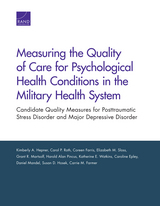
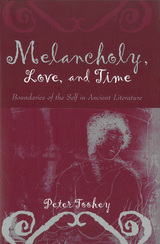
Ancient literature features many powerful narratives of madness, depression, melancholy, lovesickness, simple boredom, and the effects of such psychological states upon individual sufferers. Peter Toohey turns his attention to representations of these emotional states in the Classical, Hellenistic, and especially the Roman imperial periods in a study that illuminates the cultural and aesthetic significance of this emotionally charged literature. His probing analysis shows that a shifting representation of these afflicted states, and the concomitant sense of isolation from one's social affinities and surroundings, manifests a developing sense of the self and self-consciousness in the ancient world.
This book makes important contributions to a variety of disciplines including classical studies, comparative literature, literary and art history, history of medicine, history of emotions, psychiatry, and psychology.
Peter Toohey is Professor and Department Head of Greek and Roman Studies at the University of Calgary, Canada.
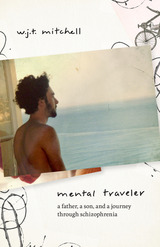
Gabriel Mitchell was diagnosed with schizophrenia at age twenty-one and died by suicide eighteen years later. He left behind a remarkable archive of creative work and a father determined to honor his son’s attempts to conquer his own illness. Before his death, Gabe had been working on a film that would show madness from inside and out, as media stereotype and spectacle, symptom and stigma, malady and minority status, disability and gateway to insight. He was convinced that madness is an extreme form of subjective experience that we all endure at some point in our lives, whether in moments of ecstasy or melancholy, or in the enduring trauma of a broken heart. Gabe’s declared ambition was to transform schizophrenia from a death sentence to a learning experience, and madness from a curse to a critical perspective.
Shot through with love and pain, Mental Traveler shows how Gabe drew his father into his quest for enlightenment within madness. It is a book that will touch anyone struggling to cope with mental illness, and especially for parents and caregivers of those caught in its grasp.
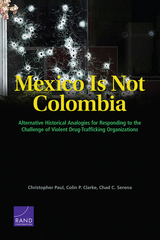
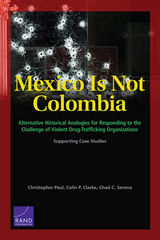
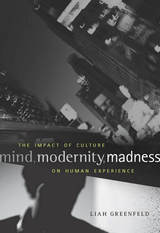
It’s the American dream—unfettered freedom to follow our ambitions, to forge our identities, to become self-made. But what if our culture of limitless self-fulfillment is actually making millions desperately ill? One of our leading interpreters of modernity and nationalism, Liah Greenfeld argues that we have overlooked the connection between egalitarian society and mental illness. Intellectually fearless, encompassing philosophy, psychology, and history, Mind, Modernity, Madness challenges the most cherished assumptions about the blessings of living in a land of the free.
Modern nationalism, says Greenfeld, rests on bedrock principles of popular sovereignty, equality, and secularism. Citizens of the twenty-first century enjoy unprecedented freedom to become the authors of their personal destinies. Empowering as this is, it also places them under enormous psychic strain. They must constantly appraise their identities, manage their desires, and calibrate their place within society. For vulnerable individuals, this pressure is too much. Training her analytic eye on extensive case histories in manic depression and schizophrenia, Greenfeld contends that these illnesses are dysfunctions of selfhood caused by society’s overburdening demands for self-realization. In her rigorous diagnosis, madness is a culturally constituted malady.
The culminating volume of Greenfeld’s nationalism trilogy, Mind, Modernity, Madness is a tour de force in the classic tradition of Émile Durkheim—and a bold foray into uncharted territory. Often counter-intuitive, always illuminating, Mind, Modernity, Madness presents a many-sided view of humanity, one that enriches our deepest understanding of who we are and what we aspire to be.

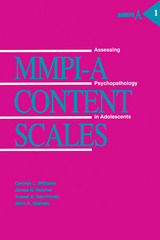
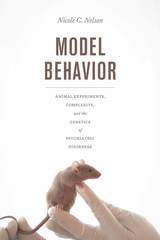
Behavior genetics is a particularly challenging field for making a clear-cut case that mouse experiments work, because researchers believe that both the phenomena they are studying and the animal models they are using are complex. These assumptions of complexity change the nature of what laboratory work produces. Whereas historical and ethnographic studies traditionally portray the laboratory as a place where scientists control, simplify, and stabilize nature in the service of producing durable facts, the laboratory that emerges from Nelson’s extensive interviews and fieldwork is a place where stable findings are always just out of reach. The ongoing work of managing precarious experimental systems means that researchers learn as much—if not more—about the impact of the environment on behavior as they do about genetics. Model Behavior offers a compelling portrait of life in a twenty-first-century laboratory, where partial, provisional answers to complex scientific questions are increasingly the norm.

Around the world, more than a million people die by suicide each year. Yet many of us know very little about a tragedy that may strike our own loved ones—and much of what we think we know is wrong. This clear and powerful book dismantles myth after myth to bring compassionate and accurate understanding of a massive international killer.
Drawing on a fascinating array of clinical cases, media reports, literary works, and scientific studies, Thomas Joiner demolishes both moralistic and psychotherapeutic clichés. He shows that suicide is not easy, cowardly, vengeful, or selfish. It is not a manifestation of "suppressed rage" or a side effect of medication. Threats of suicide, far from being idle, are often followed by serious attempts. People who are prevented once from killing themselves will not necessarily try again.
The risk for suicide, Joiner argues, is partly genetic and is influenced by often agonizing mental disorders. Vulnerability to suicide may be anticipated and treated. Most important, suicide can be prevented.
An eminent expert whose own father's death by suicide changed his life, Joiner is relentless in his pursuit of the truth about suicide and deeply sympathetic to such tragic waste of life and the pain it causes those left behind.

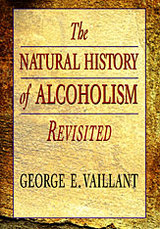
When The Natural History of Alcoholism was first published in 1983, it was acclaimed in the press as the single most important contribution to the literature on alcoholism since the first edition of Alcoholic Anonymous’s Big Book. George Vaillant took on the crucial questions of whether alcoholism is a symptom or a disease, whether it is progressive, whether alcoholics differ from others before the onset of their alcoholism, and whether alcoholics can safely drink. Based on an evaluation of more than 600 individuals followed for over forty years, Vaillant’s monumental study offered new and authoritative answers to all of these questions.
In this updated version of his classic book, Vaillant returns to the same subjects with the perspective gained from fifteen years of further follow-up. Alcoholics who had been studied to age 50 in the earlier book have now reached age 65 and beyond, and Vaillant reassesses what we know about alcoholism in light of both their experiences and the many new studies of the disease by other researchers. The result is a sharper focus on the nature and course of this devastating disorder as well as a sounder foundation for the assessment of various treatments.
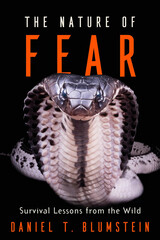
An Open Letters Review Best Book of the Year
A leading expert in animal behavior takes us into the wild to better understand and manage our fears.
Fear, honed by millions of years of natural selection, kept our ancestors alive. Whether by slithering away, curling up in a ball, or standing still in the presence of a predator, humans and other animals have evolved complex behaviors in order to survive the hazards the world presents. But, despite our evolutionary endurance, we still have much to learn about how to manage our response to danger.
For more than thirty years, Daniel Blumstein has been studying animals’ fear responses. His observations lead to a firm conclusion: fear preserves security, but at great cost. A foraging flock of birds expends valuable energy by quickly taking flight when a raptor appears. And though the birds might successfully escape, they leave their food source behind. Giant clams protect their valuable tissue by retracting their mantles and closing their shells when a shadow passes overhead, but then they are unable to photosynthesize, losing the capacity to grow. Among humans, fear is often an understandable and justifiable response to sources of threat, but it can exact a high toll on health and productivity.
Delving into the evolutionary origins and ecological contexts of fear across species, The Nature of Fear considers what we can learn from our fellow animals—from successes and failures. By observing how animals leverage alarm to their advantage, we can develop new strategies for facing risks without panic.
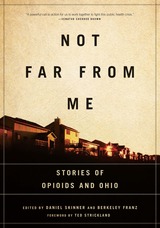
Themes of pain and healing, despair and hope are woven throughout accounts of families who have lost loved ones to addiction, stories of survival, and experiences of working on the front lines in communities. In an attempt to give every voice the chance to be heard, Not Far from Me features contributors from across the state as they engage with the pain of opioid abuse and overdose, as well as the hope that personal- and community-level transformation brings. Ultimately, Not Far from Me humanizes the battle against addiction, challenges the stigma surrounding drug users, and unflinchingly faces the reality of the American opioid epidemic.
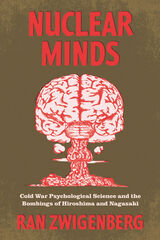
In 1945, researchers on a mission to Hiroshima with the United States Strategic Bombing Survey canvassed survivors of the nuclear attack. This marked the beginning of global efforts—by psychiatrists, psychologists, and other social scientists—to tackle the complex ways in which human minds were affected by the advent of the nuclear age. A trans-Pacific research network emerged that produced massive amounts of data about the dropping of the bomb and subsequent nuclear tests in and around the Pacific rim.
Ran Zwigenberg traces these efforts and the ways they were interpreted differently across communities of researchers and victims. He explores how the bomb’s psychological impact on survivors was understood before we had the concept of post-traumatic stress disorder. In fact, psychological and psychiatric research on Hiroshima and Nagasaki rarely referred to trauma or similar categories. Instead, institutional and political constraints—most notably the psychological sciences’ entanglement with Cold War science—led researchers to concentrate on short-term damage and somatic reactions or even, in some cases, on denial of victims’ suffering. As a result, very few doctors tried to ameliorate suffering.
But, Zwigenberg argues, it was not only that doctors “failed” to issue the right diagnosis; the victims’ experiences also did not necessarily conform to our contemporary expectations. As he shows, the category of trauma should not be used uncritically in a non-Western context. Consequently, this book sets out, first, to understand the historical, cultural, and scientific constraints in which researchers and victims were acting and, second, to explore how suffering was understood in different cultural contexts before PTSD was a category of analysis.

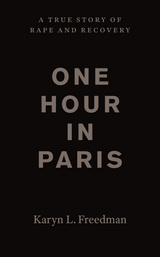
At once deeply intimate and terrifyingly universal, One Hour in Paris weaves together Freedman’s personal experience with the latest philosophical, neuroscientific, and psychological insights on what it means to live in a body that has been traumatized. Using her background as a philosopher, she looks at the history of psychological trauma and draws on recent theories of posttraumatic stress disorder and neuroplasticity to show how recovery from horrific experiences is possible. Through frank discussions of sex and intimacy, she explores the consequences of sexual violence for love and relationships, and she illustrates the steep personal cost of sexual violence and the obstacles faced by individual survivors in its aftermath. Freedman’s book is an urgent call to face this fundamental social problem head-on, arguing that we cannot continue to ignore the fact that sexual violence against women is rooted in gender inequalities that exist worldwide—and must be addressed.
One Hour in Paris is essential reading for survivors of sexual violence as well as an invaluable resource for therapists, mental health professionals, and family members and friends of victims.
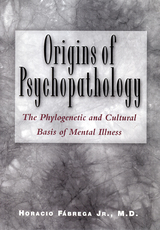
In Origins of Psychopathology, Horacio Fárega Jr. employs principles of evolutionary biology to better understand the significance of mental illness. He explores whether what psychiatry has categorized as mental disorders could have existed during earlier phases of human evolution. Fábrega approaches the prominent features of mental disorders as adaptive responses to the environment and life’s circumstances, which in turn can only be understood in the context of our evolutionary past. Taking his cue from theoretical issues raised by research into primate behavior and early hominid evolution, he poses the question: What, if any, aspects of mental illness are rooted in our evolution? Does mental illness occur in primates and other animals, and if so, what does this tell us about mental illness in human evolution? How has mental illness played an adaptive role? How has the development of language and higher cognitive functions affected characteristics of psychopathology? Fábrega synthesizes insights from both the clinical and the evolutionary points of view. This facet of psychopathology, which involves its origins and manifestations viewed across the expanse of human evolution, has, until now, been largely neglected in psychiatric education, theory, and practice.
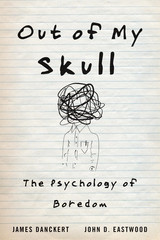
A Behavioral Scientist Notable Book of the Year
A Guardian “Best Book about Ideas” of the Year
No one likes to be bored. Two leading psychologists explain what causes boredom and how to listen to what it is telling you, so you can live a more engaged life.
We avoid boredom at all costs. It makes us feel restless and agitated. Desperate for something to do, we play games on our phones, retie our shoes, or even count ceiling tiles. And if we escape it this time, eventually it will strike again. But what if we listened to boredom instead of banishing it?
Psychologists James Danckert and John Eastwood contend that boredom isn’t bad for us. It’s just that we do a bad job of heeding its guidance. When we’re bored, our minds are telling us that whatever we are doing isn’t working—we’re failing to satisfy our basic psychological need to be engaged and effective. Too many of us respond poorly. We become prone to accidents, risky activities, loneliness, and ennui, and we waste ever more time on technological distractions. But, Danckert and Eastwood argue, we can let boredom have the opposite effect, motivating the change we need. The latest research suggests that an adaptive approach to boredom will help us avoid its troubling effects and, through its reminder to become aware and involved, might lead us to live fuller lives.
Out of My Skull combines scientific findings with everyday observations to explain an experience we’d like to ignore, but from which we have a lot to learn. Boredom evolved to help us. It’s time we gave it a chance.

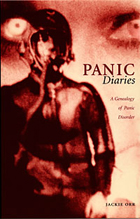
Orr, who has experienced panic attacks herself, kept a diary of her participation as a research subject in clinical trials for the Upjohn Company’s anti-anxiety drug Xanax. This “panic diary” grounds her study and suggests the complexity of her desire to track the diffusion and regulation of panic in U.S. society. Orr’s historical research, theoretical reflections, and biographical narrative combine in this remarkable and compelling genealogy, which documents the manipulation of panic by the media, the social sciences and psychiatry, the U.S. military and government, and transnational drug companies.
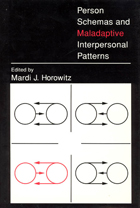
behavior and intrapsychic conflict brings together psychoanalytic researchers, social learning
theorists, and cognitive scientists. The contributors show that a fuller conceptualization of
person schemas can begin to close the gap between psychodynamic and cognitive science
research, providing new methods for understanding disorders of personality.
“There are many strengths in this volume beyond the clear presentation of the person schema
as a concept linking cognitive and psychodynamic perspectives. . . . Students will have an
opportunity for comparison of perspectives while those working in the field will have an
opportunity to follow the shift from concept to method to case application to theoretical
context for understanding personality change.”—Bertram J. Cohler, University of Chicago
Contributors are Lorna Smith Benjamin, Paul Crits-Christoph, Randolph L. Cunningham, Roy
D'Andrade, Amy Demorest, Mary Ewert, Scott H. Friedman, Frances J. Friedrich, Jess H.
Ghannam, Dianna Hartley, Mardi J. Horowitz, John F. Kihlstrom, Peter H. Knapp, Lester
Luborsky, David Mark, Thomas V. Merluzzi, Stephen E. Palmer, Carol Popp, Peter Salovey,
Pamela Schaffler, Jerome L. Singer, Charles H. Stinson, and Sandra L. Tunis.

This book--first published in 1958, and designed for courses on abnormal psychology and psychiatry--is intended to supplement the usual textbook material in abnormal psychology. Papers have been selected to introduce the student to the active and complex enterprise of investigation and hypothesis in this wide field. Conflicting evidence and allegiances, riddles and ingenuity, are displayed in order to stimulate an appreciation of the task of discovery in behavioral science.
Five general areas are represented in the selections: (i) the problem of the effects of early experience on psychological development; (2) psychosomatic disorders and neurosis; (3) schizophrenic psychosis; (4) somatic factors in psychopathology; and (5) the social context and its effects on the phenomena of behavior. Against a background of systematic study, the graduate or undergraduate student will find in the forty-six papers included here an instructive sampling of the periodical literature.
Says Robert W. White in his introduction to the book: "There is no longer an air that the problem of schizophrenia, or of neurosis, or of psychosomatic disorder is going to be solved by a stroke of insight and a simple theory. Where once it was hoped to unlock the secret of a disorder, we now know that we must creep up slowly upon its many secrets and that we must use to the utmost the help provided by scientific method. In this new climate the present book is an indispensable teaching aid."
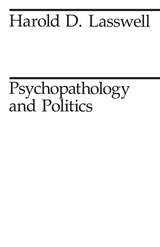

Psychosis and Schizophrenia in Hong Kong covers some of the most serious mental health conditions that top the global disease burden and affect three percent of the general population. However, most research on psychotic disorders is undertaken in the West, and few studies have been systematically carried out in Asia despite global interest in regional differences. This work offers a unique and coherent account of these disorders and their treatment in Hong Kong over the last thirty years.
Chen and his research program’s pioneering work has ranged from the impact of early intervention on outcomes and relapse prevention to the renaming of psychosis to reduce stigma. The studies have contributed to wider international debates on the optimal management of the condition. Their investigations in semantics and cognition, as well as cognition-enhancing exercise interventions, have provided novel insights into deficits encountered in the treatment of psychotic disorders and how they might be ameliorated. The research has also explored subjective experiences of psychosis and elicited unique perspectives in patients of Asian origin.
Each topic is divided into three sections: a global background of the challenges encountered; research findings from Hong Kong; and reflections that place the data in scientific and clinical contexts and offer future directions.


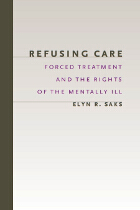
Focusing on overinterventionist approaches, Refusing Care explores when, if ever, the mentally ill should be treated against their will. Basing her analysis on case and empirical studies, Elyn R. Saks explores dilemmas raised by forced treatment in three contexts—civil commitment (forced hospitalization for noncriminals), medication, and seclusion and restraints. Saks argues that the best way to solve each of these dilemmas is, paradoxically, to be both more protective of individual autonomy and more paternalistic than current law calls for. For instance, while Saks advocates relaxing the standards for first commitment after a psychotic episode, she also would prohibit extreme mechanical restraints (such as tying someone spread-eagled to a bed). Finally, because of the often extreme prejudice against the mentally ill in American society, Saks proposes standards that, as much as possible, should apply equally to non-mentally ill and mentally ill people alike.
Mental health professionals, lawyers, disability rights activists, and anyone who wants to learn more about the way the mentally ill are treated—and ought to be treated—in the United States should read Refusing Care.
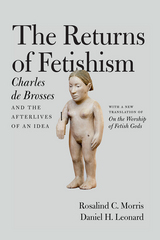
The product of de Brosses’s autodidactic curiosity and idiosyncratic theories of language, On the Worship of Fetish Gods is an enigmatic text that is often difficult for contemporary audiences to assess. In a thorough introduction to the text, Leonard situates de Brosses’s work within the cultural and intellectual milieu of its time. Then, Morris traces the concept of fetishism through its extraordinary permutations as it was picked up and transformed by the fields of philosophy, comparative religion, political economy, psychoanalysis, and anthropology. Ultimately, she breaks new ground, moving into and beyond recent studies by thinkers such as William Pietz, Hartmut Böhme, and Alfonso Iacono through illuminating new discussions on topics ranging from translation issues to Africanity and the new materialisms.
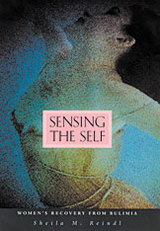
Hearing about the destructive compulsion of bulimia nervosa, outsiders may wonder, "How could you ever start?" Those suffering from the eating disorder ask themselves in despair, "How can I ever stop?" How do you break the cycle of bingeing, vomiting, laxative abuse, and shame? While many books describe the descent into eating disorders and the resulting emotional and physical damage, this book describes recovery.
Psychologist Sheila Reindl has listened intently to women's accounts of recovering. Reindl argues compellingly that people with bulimia nervosa avoid turning their attention inward to consult their needs, desires, feelings, and aggressive strivings because to do so is to encounter an annihilating sense of shame. Disconnected from internal, sensed experience, bulimic women rely upon external gauges to guide their choices. To recover, bulimic women need to develop a sense of self--to attune to their physical, psychic, and social self-experience. They also need to learn that one's neediness, desire, pain, and aggression are not sources of shame to be kept hidden but essential aspects of humanity necessary for zestful life. The young women with whom Reindl speaks describe, with great feeling, their efforts to know and trust their own experience.
Perceptive, lucid, and above all humane, this book will be welcomed not only by professionals but by people who struggle with an eating disorder and by those who love them.
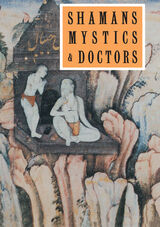
"With extraordinary sympathy, open-mindedness, and insight Sudhir Kakar has drawn from both his Eastern and Western backgrounds to show how the gulf that divides native healer from Western psychiatrist can be spanned."—Rosemary Dinnage, New York Review of Books
"Each chapter describes the geographical and cultural context within which the healers work, their unique approach to healing mental illness, and . . . the philosophical and religious underpinnings of their theories compared with psychoanalytical theory."—Choice

Dana Crowley Jack offers startling new insights into the roots of female depression as she illuminates why women are far more likely than men to suffer major depression in adulthood. Silencing the Self is the first sweeping overview of depression in women that draws on new understandings of the importance of relationships in women’s lives. Attending closely to what depressed women have to say about their lives, Jack reframes major concepts of depression, freeing them from traditional models that have restricted our ability to listen to women’s perspectives on depression.
Jack weaves these voices of depressed women directly into her discussion, providing new meanings to familiar themes: dependence, pleasing, anger, goodness, low self-esteem. These women clearly articulate a no-win, either/or tension in their lives, a tension between sacrificing their own needs in order to preserve a relationship and acting on their needs and feelings at the risk of losing the relationship. Their stories bring to light the “activity required to be passive”—the way women actively silence themselves in order to cultivate and maintain intimate relationships. To accommodate, they learn to censor themselves, to devalue their experience, to repress anger, to be silent. Examining moral themes in depressed women’s narratives, Jack demonstrates how internalized cultural expectations of feminine goodness affect women’s behavior in relationships and precipitate the plunge into depression. In a brilliant synthesis, Jack draws on myth and fairy tale for metaphors to further the understanding of depressed women.
Silencing the Self makes a major contribution to the psychology of women by drawing from the recent literature on women’s relational self and detailing its relevance to female depression. This insightful approach to the dynamic of female depression forges new pathways to self-change, therapy, and research.
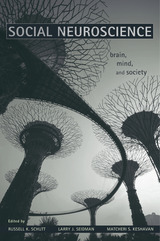
Human beings evolved in the company of others and flourish in proportion to their positive social ties. To understand the human brain, we must situate its biology in the wider context of society. To understand society, we must also consider how the brains and minds of individuals shape interactions with other human beings. Social Neuroscience offers a comprehensive new framework for studying the brain, human development, and human behavior.
In this book, leading researchers in the fields of neurobiology, psychiatry, psychology, and sociology elucidate the connections between brain biology and the brain’s functioning in the social world, providing a state-of-the-art interdisciplinary explanation of how humans think and act, as well as the ways we define and treat pathological behavior. Synthesizing the insights and perspectives of these experts, Social Neuroscience examines how neural processes make the brain sensitive to social experience, how cognition shapes social behavior, and how social networks create a range of responses among different individuals to the same environmental stimuli.
The mutually reinforcing connections between brain, mind, and society have profound implications for human health, from the emotionally damaging effects of severe social deprivation to the neurological impact of parental abuse and neighborhood violence. The authors explore these connections, with special focus on mental illnesses, including schizophrenia—a disorder characterized by marked social deficits in which a neurological basis is now well established.

In 1989 Jennifer Johnson was convicted of delivering a controlled substance to a minor. That the minor happened to be Johnson's unborn child made her case all the more complex, controversial, and ultimately, historical. Stephen R. Kandall, a neonatologist and pediatrician, testified as an expert witness on Johnson's behalf. The experience caused him to wonder how one disadvantaged black woman's case became a prosecutorial battlefield in the war on drugs. This book is the product of Kandall's search through the annals of medicine and history to learn how women have fared in this conflict and how drug-dependent women have been treated for the past century and a half.
Kandall's sleuthing uncovers an intriguing and troubling story. Opium, laudanum, and morphine were primary ingredients in the curative "powders" and strengthening "tonics" that physicians freely prescribed and pharmacists dispensed to women a hundred and fifty years ago. Or a woman could easily dose herself with narcotics and alcohol in the readily available form of "patent" medicines sold in every town and touted in popular magazines ("Over a million bottles sold and in every one a cure!"). For the most part unaware of their dangers, women turned to these remedies for "female complaints," such as "womb disease" and "congestion of the ovaries," as well as for "neurasthenia," a widespread but vague nervous malady attributed to women's weaker, more sensitive natures. Not surprisingly, by the latter half of the nineteenth century the majority of America's opiate addicts were women.
The more things change, the more they remain the same: Substance and Shadow shows how, though attitudes and drugs may vary over time--from the laudanum of yesteryear to the heroin of the thirties and forties, the tranquilizers of the fifties, the consciousness-raising or prescription drugs of the sixties, and the ascendance of crack use in the eighties--dependency remains an issue for women. Kandall traces the history of questionable treatment that has followed this trend. From the maintenance clinics of the early twenties to the "federal farms" of mid-century to the detoxification efforts and methadone maintenance that flourished in the wake of the Women's Movement, attempts to treat drug-dependent women have been far from adequate. As he describes current policies that put money into drug interdiction and prisons, but offer little in the way of treatment or hope for women like Jennifer Johnson, Kandall calls our attention to the social and personal costs of demonizing and punishing women addicts rather than trying to improve their circumstances and give them genuine help.
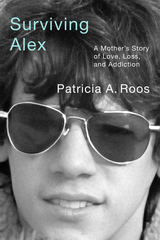
Weaving together a personal narrative and a sociological perspective, Surviving Alex movingly describes how even children from “good families” fall prey to addiction, and recounts the hellish toll it takes on families. Drawing from interviews with Alex’s friends, family members, therapists, teachers, and police officers—as well as files from his stays in hospitals, rehab facilities, and jails—Roos paints a compelling portrait of a young man whose life veered between happiness, anxiety, success, and despair. And as she explores how a punitive system failed her son, she calls for a community of action that would improve care for substance users and reduce addiction, realigning public health policy to address the overdose crisis.
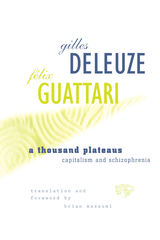
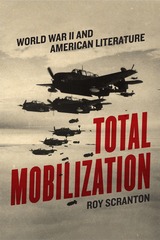
Since World War II, the story of the trauma hero—the noble white man psychologically wounded by his encounter with violence—has become omnipresent in America’s narratives of war, an imaginary solution to the contradictions of American political hegemony. In Total Mobilization, Roy Scranton cuts through the fog of trauma that obscures World War II, uncovering a lost history and reframing the way we talk about war today.
Considering often overlooked works by James Jones, Wallace Stevens, Martha Gellhorn, and others, alongside cartoons and films, Scranton investigates the role of the hero in industrial wartime, showing how such writers struggled to make sense of problems that continue to plague us today: the limits of American power, the dangers of political polarization, and the conflicts between nationalism and liberalism. By turning our attention to the ways we make war meaningful—and by excavating the politics implicit within the myth of the traumatized hero—Total Mobilization revises the way we understand not only World War II, but all of postwar American culture.
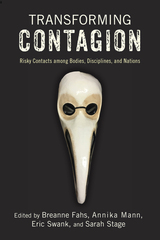
Moving from viruses, vaccines, and copycat murder to gay panics, xenophobia, and psychopaths, Transforming Contagion energetically fuses critical humanities and social science perspectives into a boundary-smashing interdisciplinary collection on contagion. The contributors provocatively suggest contagion to be as full of possibilities for revolution and resistance as it is for the descent into madness, malice, and extensive state control. The infectious practices rooted in politics, film, psychological exchanges, social movements, the classroom, and the circulation of a literary text or meme on social media compellingly reveal patterns that emerge in those attempts to re-route, quarantine, define, or even exacerbate various contagions.
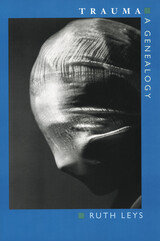
In a book that is bound to ignite controversy, Ruth Leys investigates the history of the concept of trauma. She explores the emergence of multiple personality disorder, Freud's approaches to trauma, medical responses to shellshock and combat fatigue, Sándor Ferenczi's revisions of psychoanalysis, and the mutually reinforcing, often problematic work of certain contemporary neurobiological and postmodernist theorists. Leys argues that the concept of trauma has always been fundamentally unstable, oscillating uncontrollably between two competing models, each of which tends at its limit to collapse into the other.
A powerfully argued work of intellectual history, Trauma will rewrite the terms of future discussion of its subject.
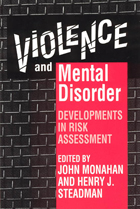
"Essential for all those who are interested in the study of risk assessment of violence. It is particularly important for the researcher in this area. . . . For the clinician who must make violence assessments it is important reading as well."—Stewart Levine, Bulletin of the American Academy of Psychiatry and the Law

Originally published in German as Die Gesellschaft der Uberlebenden, The War in Their Minds examines hitherto unused source material—psychiatric medical files of soldiers—to make clear how difficult it was for the soldiers and their families to readjust to normal, everyday life. Goltermann allows these testimonies of violence, guilt, justification, and helplessness speak for themselves and sensitively explores how the pension claims of returning soldiers were to compete with the claims of the Holocaust victims to compensation.
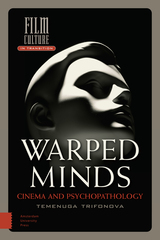
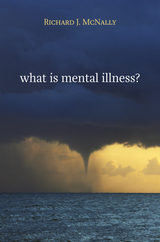
According to a major health survey, nearly half of all Americans have been mentally ill at some point in their lives—more than a quarter in the last year. Can this be true? What exactly does it mean, anyway? What’s a disorder, and what’s just a struggle with real life?
This lucid and incisive book cuts through both professional jargon and polemical hot air, to describe the intense political and intellectual struggles over what counts as a “real” disorder, and what goes into the “DSM,” the psychiatric bible. Is schizophrenia a disorder? Absolutely. Is homosexuality? It was—till gay rights activists drove it out of the DSM a generation ago. What about new and controversial diagnoses? Is “social anxiety disorder” a way of saying that it’s sick to be shy, or “female sexual arousal disorder” that it’s sick to be tired?
An advisor to the DSM, but also a fierce critic of exaggerated overuse, McNally defends the careful approach of describing disorders by patterns of symptoms that can be seen, and illustrates how often the system medicalizes everyday emotional life.
Neuroscience, genetics, and evolutionary psychology may illuminate the biological bases of mental illness, but at this point, McNally argues, no science can draw a bright line between disorder and distress. In a pragmatic and humane conclusion, he offers questions for patients and professionals alike to help understand, and cope with, the sorrows and psychopathologies of everyday life.
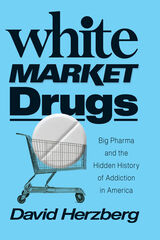
These markets are widely acknowledged but no one has explained how they became so central to the medical system in a nation famous for its “drug wars”—until now. Drawing from federal, state, industry, and medical archives alongside a wealth of published sources, Herzberg re-connects America’s divided drug history, telling the whole story for the first time. He reveals that the driving question for policymakers has never been how to prohibit the use of addictive drugs, but how to ensure their availability in medical contexts, where profitability often outweighs public safety. Access to white markets was thus a double-edged sword for socially privileged consumers, even as communities of color faced exclusion and punitive drug prohibition. To counter this no-win setup, Herzberg advocates for a consumer protection approach that robustly regulates all drug markets to minimize risks while maintaining safe, reliable access (and treatment) for people with addiction.
Accomplishing this requires rethinking a drug/medicine divide born a century ago that, unlike most policies of that racially segregated era, has somehow survived relatively unscathed into the twenty-first century.
By showing how the twenty-first-century opioid crisis is only the most recent in a long history of similar crises of addiction to pharmaceuticals, Herzberg forces us to rethink our most basic ideas about drug policy and addiction itself—ideas that have been failing us catastrophically for over a century.
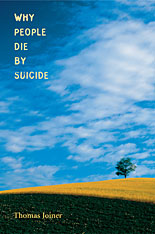
In the wake of a suicide, the most troubling questions are invariably the most difficult to answer: How could we have known? What could we have done? And always, unremittingly: Why? Written by a clinical psychologist whose own life has been touched by suicide, this book offers the clearest account ever given of why some people choose to die.
Drawing on extensive clinical and epidemiological evidence, as well as personal experience, Thomas Joiner brings a comprehensive understanding to seemingly incomprehensible behavior. Among the many people who have considered, attempted, or died by suicide, he finds three factors that mark those most at risk of death: the feeling of being a burden on loved ones; the sense of isolation; and, chillingly, the learned ability to hurt oneself. Joiner tests his theory against diverse facts taken from clinical anecdotes, history, literature, popular culture, anthropology, epidemiology, genetics, and neurobiology--facts about suicide rates among men and women; white and African-American men; anorexics, athletes, prostitutes, and physicians; members of cults, sports fans, and citizens of nations in crisis.
The result is the most coherent and persuasive explanation ever given of why and how people overcome life's strongest instinct, self-preservation. Joiner's is a work that makes sense of the bewildering array of statistics and stories surrounding suicidal behavior; at the same time, it offers insight, guidance, and essential information to clinicians, scientists, and health practitioners, and to anyone whose life has been affected by suicide.
READERS
Browse our collection.
PUBLISHERS
See BiblioVault's publisher services.
STUDENT SERVICES
Files for college accessibility offices.
UChicago Accessibility Resources
home | accessibility | search | about | contact us
BiblioVault ® 2001 - 2024
The University of Chicago Press



